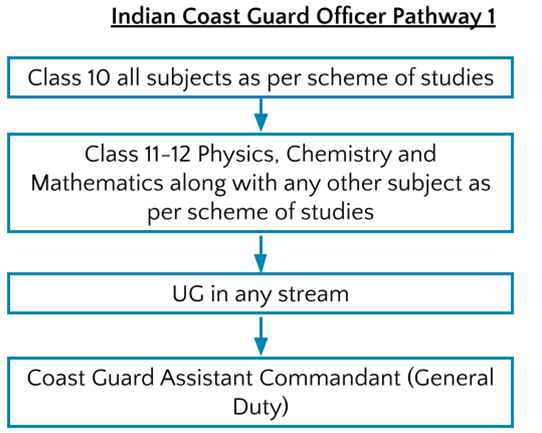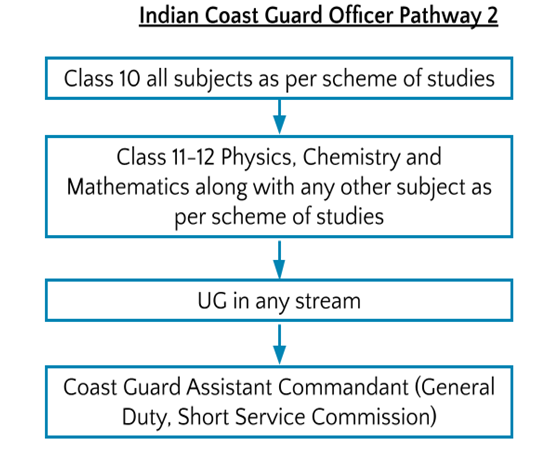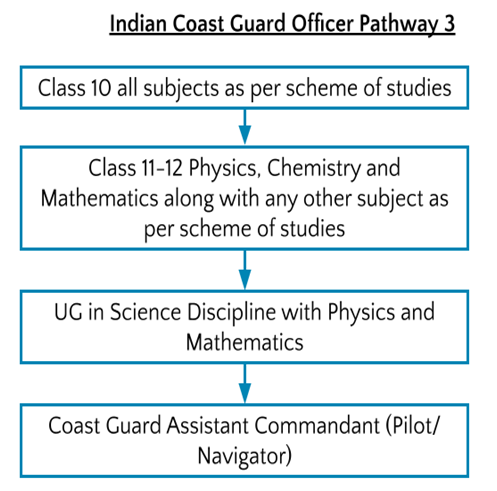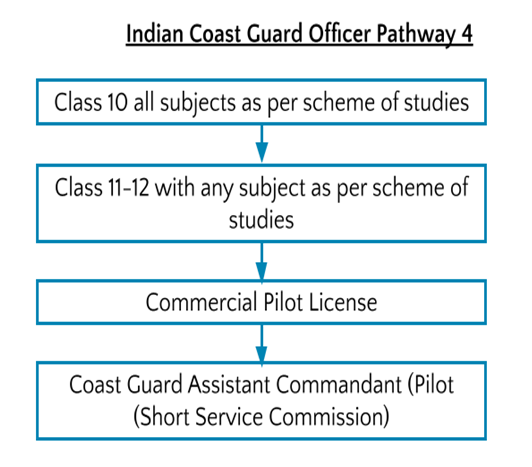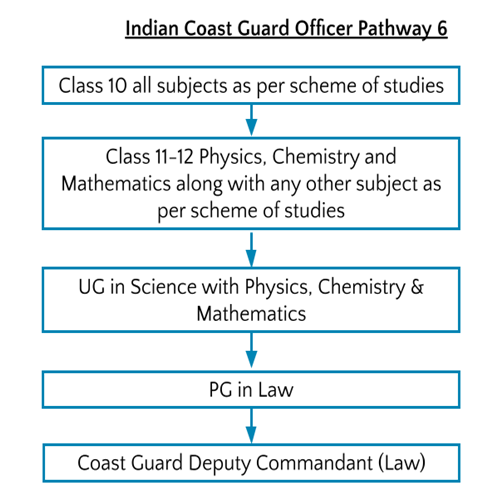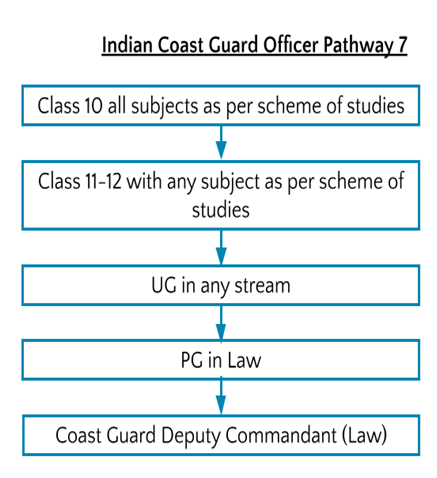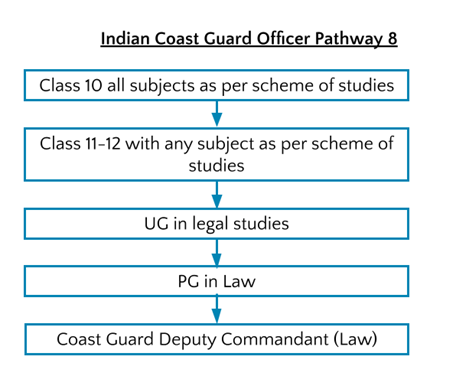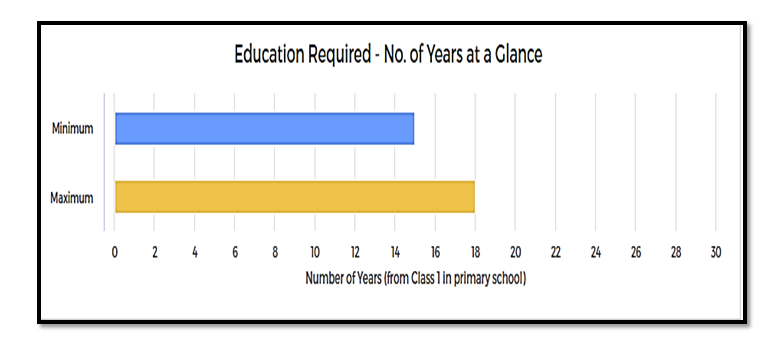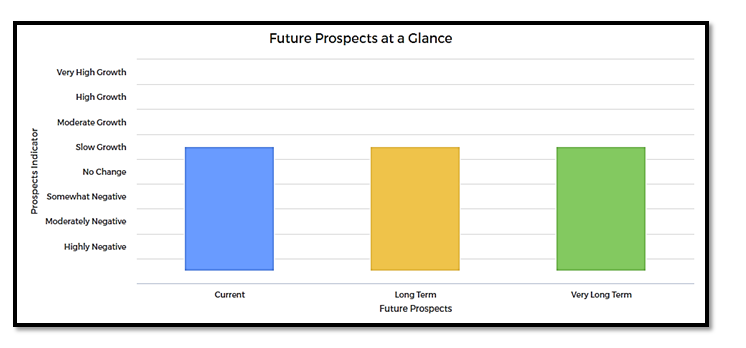Indian Coast Guard Officer
Entry Level Qualification
Graduate
Career Fields
Government & Defense Services
For Specially Abled

Career Entrance Exam
About Career
Indian Coast Guard Officer is part of the Indian Defence system that includes the Indian Army, Indian Navy and Indian Air Force. As a coast guard officer, you will work primarily to safeguard the Indian coast and its territorial waters. You will patrol the sea with the ships equipped with weapons and sensors. You might be also flying aircraft if you join the pilot department. However, in both cases, you will patrol the sea and ensure that you control anti-national activities, smuggling, terrorism, theft, treason, etc. You will also coordinate with different Indian states and provide them with all intelligence information.
Key roles and responsibilities
As an Indian Coastal Guard Office, you might be handling these following roles and responsibilities:
1. You would be responsible for the overall safety and protection of artificial islands, offshore terminals and other installations of Government of India.
2. You will protect mariners and fishermen. You would provide them required assistance too.
3. You would work to preserve and protect marine ecology and environment around the Indian shore.
4. You will work with the department of customs and assist them in nabbing any anti-smuggling operations.
5. You would be required to enforce the law in the territorial and international water around the Indian coast.
6. You will also collect scientific data for any scientific research around India coast.
7. In case of any hostility and war, you will support the Indian Navy for national defence.
8. You will assist the Indian Intelligence department for information on terrorism, national security.
9. As a Coastal guard officer, you will be responsible for overall security of the Indian coast and coordinate with Indian states related to coastal security
PARTICULARS | DESCRIPTION |
Name | Indian Coast Guard Officer |
Purpose | Overall Safety And Protection |
Career Field | Government & Defense Services |
Required Entrance Exam | UPSC NDA |
Average Salary | 8,00,000 - 20,00,000 Rs. Per Year |
Companies For You | General Duty Officers, Pilot Officers, Technical Officers & Many More |
Who is Eligible | Graduate |
Career Entry Pathway
Class 10 all subjects as per scheme of studies – Class 11-12 Physics, Chemistry and Mathematics along with any other subject as per scheme of studiess – UG in any stream – Coast Guard Assistant Commandant (General Duty)
After Class 11-12 Physics, Chemistry and Mathematics along with any other subject as per scheme of studies and then study for an undergraduate degree in any stream. You can then join as an assistant Commandant in General Duty.
Class 10 all subjects as per scheme of studies – Class 11-12 Physics, Chemistry and Mathematics along with any other subject as per scheme of studies – UG in any Discipline – Coast Guard Assistant Commandant (General Duty, Short Service Commission)
After Class 11-12 Physics, Chemistry and Mathematics along with any other subject as per scheme of studies and then study for an undergraduate degree in any Discipline. You can then join as an assistant Commandant in General Duty (Short Service Commission).
Class 10 all subjects as per scheme of studies – Class 11-12 Physics, Chemistry and Mathematics along with any other subject as per scheme of studies – UG in Science Discipline with Physics and Mathematics– Coast Guard Assistant Commandant (Pilot/ Navigator)
After Class 11-12 Physics, Chemistry and Mathematics along with any other subject as per scheme of studies and then study for an undergraduate degree in Science stream with Physics and Mathematics. You can then join as an assistant Commandant in General Duty (Pilot/ Navigation).
Class 10 all subjects as per scheme of studies – Class 11-12 with any subject as per scheme of studies – Commercial Pilot License – Coast Guard Assistant Commandant (Pilot (Short Service Commission)
After Class 11-12 with any subject as per scheme of studies, you can study any stream in your higher secondary school and then Obtain a Commercial Pilot License. You can then join as an assistant Commandant in General Duty (Pilot) for Short Service Commission.
Class 10 all subjects as per scheme of studies – Class 11-12 Physics, Chemistry and Mathematics along with any other subject as per scheme of studies – UG in Engineering Stream – Coast Guard Assistant Commandant (Technical Duty)
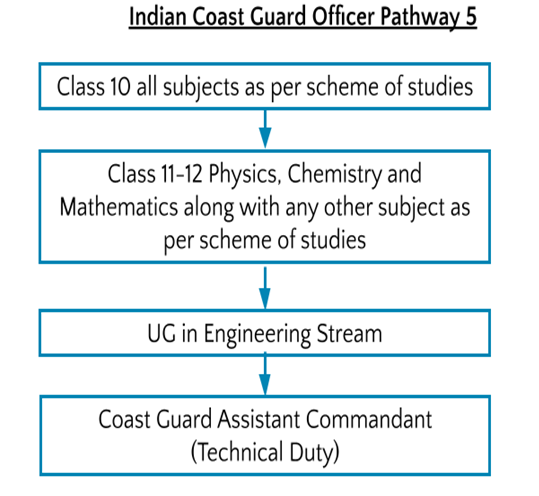
After Class 11-12 Physics, Chemistry and Mathematics along with any other subject as per scheme of studies and then study for an undergraduate degree in Engineering Stream (Naval Architecture/ Mechanical/ Marine/Electrical/ Electronics & Telecommunications/ Design/Production/ Aeronautical / Metallurgy/ Aerospace/ Control Engineering). You can then join as an assistant Commandant in Technical Duty.
Class 10 all subjects as per scheme of studies – Class 11-12 Physics, Chemistry and Mathematics along with any other subject as per scheme of studies – UG in Science with Physics, Chemistry & Mathematics – PG in Law - Coast Guard Deputy Commandant (Law)
After Class 11-12 Physics, Chemistry and Mathematics along with any other subject as per scheme of studies and then study for an undergraduate degree in Science stream with any subjects. You can then study Law (LL.B.). You can then join as an assistant Commandant in Law.
Class 10 all subjects as per scheme of studies – Class 11-12 with any subject as per scheme of studies – UG in any discipline – PG in Law - Coast Guard Deputy Commandant (Law)
After Class 11-12 with any subject as per scheme of studies and then study for an undergraduate degree in any discipline with any subjects. You can then study Law (LL.B.). You can then join as an assistant Commandant in Law.
Class 10 all subjects as per scheme of studies – Class 11-12 with any subject as per scheme of studies – UG in legal studies – PG in Law - Coast Guard Deputy Commandant (Law)
After Class 11-12 with any subject as per scheme of studies and then study for an undergraduate degree in legal studies. You can then study Law (LL.B.). You can then join as an assistant Commandant in Law.
Required Qualification & Competencies
Undergraduate studies after school:
1. There are several ways to become an officer in Naval Coastal Guards, and each one of them has a different educational requirement.
2. You can study Engineering Stream (Naval Architecture/ Mechanical/ Marine/Electrical/ Electronics & Telecommunications/ Design/Production/ Aeronautical / Metallurgy/ Aerospace/ Control Engineering) if you looking for a Pilot role in the Coastal service.
3. You can study Science with Physics and Mathematics if you are looking for a Pilot / Navigation role in coastal guards.
4. You can study any stream with any subjects if you are looking for a general duty role in Coastal guards.
5. You can study Business Administration if you are looking for a role of Law officer in Coastal guards.
6. If you have a commercial pilot license then also you can look for a short service commission Pilot role in Coastal Guards.
Post Graduate studies:
1. For the role of office in Indian Coastal guards, you do not need a post-graduate degree in any role but Law officer.
2. For a Deputy Commandant role in Law, you will need a post-graduate degree in Law.
MINIMUM EDUCATION REQUIRED | MAXIMUM EDUCATION REQUIRED |
Under Graduate Undergraduate Degree / Honours Diploma / Graduate Diploma (equivalent to a Degree) Programs for which the minimum eligibility is a pass in Higher Secondary / Class XII School Leaving examination. | Post Graduate Postgraduate Degree / Diploma / Certificate Programs for which the minimum eligibility is a pass in Graduation / equivalent Diploma program like Honours Diploma or Graduate Diploma. |
COMPETENCIES REQUIRED
You should have the following occupational interests:
1. Enterprising - You should have interests for Enterprising Occupations. Enterprising occupations involve taking initiatives, initiating actions, and planning to achieve goals, often business goals. These involve gathering resources and leading people to get things done. These require decision making, risk-taking and action orientation.
2. Realistic - You should have interests for Realistic Occupations. Realistic occupations involve more practical and hands-on activities than paperwork or office work. Realistic occupations often involve physical activities for getting things done using various tools and equipment.
Following personality attributes are required:
1. You are always or mostly organised in your day-to-day life and activities.
2. You are always or mostly disciplined in your action and behaviour.
3. You don't trust others easily.
4. You are always calm or generally remain calm in most situations.
5. You always or mostly prefer to stick within a routine or carry out routine and repetitive activities.
6. You are always or mostly dependent on others or on set rules and procedures.
You should have the following skills and knowledge:
1. Judging & decision making - Skills in considering the pros and cons of various decision alternatives; considering costs and benefits; taking appropriate and suitable decisions.
2. Active Listening - Giving full attention to what other people are saying, understanding the points being made by others, asking questions, etc.
3. Critical Thinking - Skills in the analysis of complex situations, using logic and reasoning to understand the situations and take appropriate actions or make interpretations and inferences.
4. Coordination - Skills in working together with other people to get things done.
5. Problem Solving - Skills in analysis and understanding of problems, evaluating various options to solve the problems and using the best option to solve the problems.
6. Law & Government - Knowledge of laws, legal codes, legal procedures, regulations, Government orders, etc.
7. Public Safety & Security - Knowledge of relevant equipment, policies, procedures, and strategies to maintain law and order situations, providing state or national security for protecting geographical territories, marine territories and sky from potential enemy attacks and protecting people and properties.
8. Transportation - Knowledge of principles and methods for moving people or goods by air, rail, sea, river, or road, or otherwise, including the relative costs and benefits.
You should have the following aptitudes and abilities:
1. Far Vision - The ability to see details at a distance.
2. Oral Comprehension - The ability to listen to and understand information and ideas presented through spoken words and sentences.
3. Oral Expression: The ability to communicate information and ideas in speaking so others will understand.
4. Control Precision: The ability to quickly and repeatedly adjust the controls of a machine or a vehicle to exact positions.
5. Spatial Orientation: The ability to know your location in relation to the environment or to know where other objects are in relation to you.
Career - Job Opportunities & Profiles
Indian Coastal Guards Officer jobs is a government of India job. There is a strict hierarchy in the job, and the only way to enter is by becoming an assistant Commandant. It is the lowest level rank in the officer category.
1. However, if you are a lawyer with 8 years of work experience, you can join directly as deputy Commandant.
2. After Short service commission or full commission, you can also join as an officer in the Merchant Navy.
Work Environment
Coast Guards have a very disciplined work environment. You will follow a strict hierarchy structure. The work will involve both office work and field work. You might be required to work overnight many times. The field work includes onboard of coast guards patrol ships, helicopters and planes. This might include controlling these unites. It is a responsible work where other people life depends on you. It requires discipline, courage, high energy, focus and attention. The work in the field is intense, and the use of weapons for self-protection or counterattack is also possible.
Specialisation Tracks In This Career
1. General Duty Officers (Indian Coast Guard)
As a General Duty officer, you would be commanding the ships at sea. You would operate any weapons, sensors and any kind of equipment on the ship. You would be responsible for the safety of equipment and people on the ship.
2. Pilot Officers (Indian Coast Guard)
As a pilot officer, you will get an opportunity to work at the shore work stations along the India coast. You will fly fixed wings aircraft for surveillance of the exclusive economic zone. You will also fly helicopters as part of patrol team of Indian Coastal guards.
3. Technical Officers (Indian Coast Guard)
Technical Officers are responsible for the operation of all equipment and technologies on board of coast guard vessels (both air and shore installations).
4. Law Officers (Indian Coast Guard)
Law Officers act as legal advisers to their respective commanders. They represent the Indian Coast Guard in legal actions filed by or against the organisation. They also perform the duties of trial law officers in Coast Guard courts, convened to try delinquent Coast Guard personnel.
Career Growth
You will join Indian Coastal guards as an Assistant Commandant. With time, you will be promoted to Deputy Commandant. Later, you will be promoted to Commandant (Junior Grade). Few of you will be later promoted to Commandant. With a growing tenure in the coastal guard’s service, you will be promoted to Deputy Inspector General. Few of you will succeed in becoming Inspector General. Finally, the rarest of rare will become the head of Coastal Guards in the rank of Director General.
Salary Offered
1. At the entry level, you will join as an assistant Commandant. Your gross salary Rs. 56,1000 to 1,77,500 per month with a grade pay of Rs. 5,400 per month.
2. As a Deputy Commandant, your gross salary will range from Rs. 67,700 to 2,08,000 per month and grade pay of Rs. 6,600.
3. As a Commandant (Junior Grade), your gross salary will range from Rs. 78,800 to 2,08,700 per month and grade pay of Rs. 7,600.
4. As a Commandant, your gross salary will range from Rs. 1,23,100 to 2,15,900 per month and grade pay of Rs. 8,700.
5. As a Deputy Inspector General, your gross salary will range from Rs. 1,31,100 to 2,16,600 per month and grade pay of Rs. 8,900.
6. As an Inspector General, your gross salary will range from Rs. 1,44,200 to 2,18,200 per month and grade pay of Rs. 10,000.
7. As a Director General, your gross salary will range from Rs. 182,200 INR to 2,24,100 per month.
8. Apart from the salary, you would also get several other benefits from the Government of India. You will also get kit maintenance allowance, sea duty allowance, Island special duty allowance. You will be also entitled to ration, medical insurance, government accommodation for family, insurance cover, canteen facility, etc.
Monthly Earning In Indian Rupee
Entry Level | Junior Level | Mid Level | Senior Level | |||||
Min Earning | Max Earning | Min Earning | Max Earning | Min Earning | Max Earning | Min Earning | Max Earning | |
56000 | 177500 | 123900 | 215000 | 182000 | 224000 | 250000 | 25000 | |
1. Entry level: 0 - 2 years of work experience
2. Junior Level: From 1 to 12 years of work experience
3. Mid-Level: From 5 to 20+ years of work experience
4. Senior Level: From 10 to 25+ years of work experience
Work Activities
As an Indian Coast Guard Officer, you would be required to do the following work activities on a regular basis:
1. Operating machines, equipment, devices, systems and processes - Using various methods and techniques to operate machines, equipment, devices, systems and processes in industrial and other settings.
2. Operating vehicles, mechanized devices, or other movable devices - Running, manoeuvring, navigating, or driving vehicles or mechanized equipment, such as forklifts, passenger vehicles, aircraft, or watercraft.
3. Inspecting equipment, systems, structures, and materials - Inspecting equipment, systems, structures, and materials to ascertain quality, performance, defects, causes of errors, etc.
4. Identifying objects, actions, and events - Identifying various characteristics of objects; observing and understanding actions and events; understanding changes in actions and events.
5. Decision making & problem solving -.Analysis of data and information; evaluation of alternative decisions and results of decisions; taking the right decisions and solving problems.
Future Prospects
Indian Coastal Guards service is a government job. There is a limited number of openings in the field. Also, the Government focuses on hiring people based on skills, but they do not compromise the selection. Thus, many times the number of seats remain empty. The number of jobs is not likely to be increased in the near future. Thus, if you are really dedicated to this career, then only you should think of entering this career.
Future Prospects At A Glance
Current (0-1 year) | Long Term (2-5 year) | Very Long Term (6-10 years) |
Slow Growth | Slow Growth | Slow Growth |

